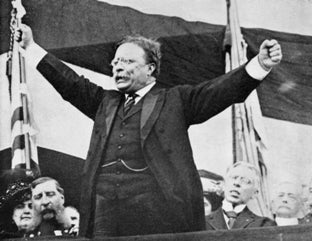Writers of the world, rejoice: It turns out we don’t have to write well to write powerfully.
Consider Herbert Croly. Few Americans in 2013 are familiar with the name. But 100 years ago, Croly was among the country’s most influential intellectuals. He co-founded The New Republic and edited it for a decade. And his ideas shaped modern liberalism.
Croly’s book, The Promise of American Life, inspired Theodore Roosevelt to launch a progressive bid for the presidency in 1912. That split the Republican Party and allowed Woodrow Wilson to win the Oval Office. Conservatives have been fighting back ever since.
Croly’s writing was anything but flowing. “The Promise of American Life is not an easy read. More than one reader has remarked on its turgid prose,” Sidney Pearson writes in a new essay about Croly, part of Heritage’s Makers of American Political Thought series. Still, to read the book “even a century after its publication is to be reminded how much of subsequent Progressive thought echoes Croly and how many of the tensions in Croly remain tensions within the liberal tradition.”
Croly, for example, believed the Progressive state needed intellectuals to make it work, as Pearson notes:
Progressives brought scientific excellence into the policymaking process, and who can quarrel with science? Scientific politics, in the form of public administration, would replace opinion with knowledge and politics with administration, thereby offering a solution to the eternal problem of conflict in human societies.
A century later, the federal government is loaded with “experts.” We were repeatedly told that former Energy Secretary Steven Chu was a Nobel Prize winner. Yet that didn’t keep his department from making bad investments in Solyndra, A123 Systems, and dozens of other companies. “The government’s picking winners and losers in the energy market has cost taxpayers billions of dollars,” Heritage’s Ashe Schow wrote last year, “and the rate of failure, cronyism, and corruption at the companies receiving the subsidies is substantial.” Expertise in government is overrated.
But Croly didn’t simply want the government picking winners and losers; he wanted the government to bring down some and lift up others, as Pearson writes:
Progressive politicians would participate in this eschatological unfolding of history by removing first property and later other sources of conflict as the precondition for a purer form of democracy. This in turn required the concentration of power in the state in order to remake the national community into a more egalitarian and less individualistic community through a system of government regulation and income redistribution.
How’s that playing out today? “Three House committees have added up the total hours of burden that Obamacare’s regulations will cost Americans: over 127 million hours per year of paperwork,” writes Heritage’s Alyene Senger. And that’s just one law. “During the first three years of the Obama Administration, 106 new major federal regulations added more than $46 billion per year in new costs for Americans,” write James Gattuso and Diane Katz in a Red Tape Rising report.
In Croly’s day, these progressive ideas had never been tried, so it was feasible for him to think they might work. A century later, they’ve failed—spectacularly. We need to read Croly and understand him. Not so we can praise him but so we can finally bury his philosophy.























